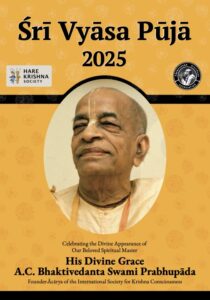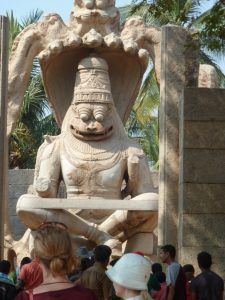CC adi 2.66–The import of this verse has stopped you from arguing. Now listen to another verse of Śrīmad-Bhāgavatam.
Adi 2.67–“All these incarnations of Godhead are either plenary portions or parts of the plenary portions of the puruṣa-avatāras. But Kṛṣṇa is the Supreme Personality of Godhead Himself. In every age He protects the world through His different features when the world is disturbed by the enemies of Indra.”
Adi 2.68-The Bhāgavatam describes the symptoms and deeds of the incarnations in general and counts Śrī Kṛṣṇa among themAdi
2.69-This made Sūta Gosvāmī greatly apprehensive. Therefore he distinguished each incarnation by its specific symptoms.
Adi 2.70-All the incarnations of Godhead are plenary portions or parts of the plenary portions of the puruṣa-avatāras, but the primeval Lord is Śrī Kṛṣṇa. He is the Supreme Personality of Godhead, the fountainhead of all incarnations.
Adi 2.71-An opponent may say, “This is your interpretation, but actually the Supreme Lord is Nārāyaṇa, who is in the transcendental realm.
Adi 2.72-“He [Nārāyaṇa] incarnates as Lord Kṛṣṇa. This is the meaning of the verse as I see it. There is no need for further consideration.”
Adi 2.73-To such a misguided interpreter we may reply, “Why should you suggest such fallacious logic? An interpretation is never accepted as evidence if it opposes the principles of scripture.
Adi 2.74- ‘One should not state a predicate before its subject, for it cannot thus stand without proper support.’
PURPORT-This rhetorical rule appears in the Ekādaśī-tattva, Thirteenth Canto, in connection with the metaphorical use of words. An unknown object should not be put before the known subject because the object has no meaning if the subject is not first given.
Adi 2.75-“If I do not state a subject, I do not state a predicate. First I speak the former and then I speak the latter.
Adi 2.76-“The predicate of a sentence is what is unknown to the reader, whereas the subject is what is known to him.
Adi 2.77-“For example, we may say: ‘This vipra is a greatly learned man.’ In this sentence, the vipra is the subject, and the predicate is his erudition.
Adi 2.78-“The man’s being a vipra is known, but his erudition is unknown. Therefore the person is identified first and his erudition later.
Adi 2.79-“In the same way, all these incarnations were known, but whose incarnations they are was unknown.
Adi 2.80-“First the word, ‘ete’ [‘these’], establishes the subject [the incarnations]. Then ‘plenary portions of the puruṣa-avatāras’ follows as the predicate.
Adi 2.81-“In the same way, when Kṛṣṇa was first counted among the incarnations, specific knowledge about Him was still unknown.
Adi 2.82-“Therefore first the word ‘kṛṣṇa’ appears as the subject, followed by the predicate, describing Him as the original Personality of Godhead.
Adi 2.83-This establishes that Śrī Kṛṣṇa is the original Personality of Godhead. The original Personality of Godhead is therefore necessarily Kṛṣṇa.
Adi 2.84-“Had Kṛṣṇa been the plenary portion and Nārāyaṇa the primeval Lord, the statement of Sūta Gosvāmī would have been reversed.
Adi 2.85-“Thus he would have said: ‘Nārāyaṇa, the source of all incarnations, is the original Personality of Godhead. He has appeared as Śrī Kṛṣṇa.’
Adi 2.86-“Mistakes, illusions, cheating and defective perception do not occur in the sayings of the authoritative sages.
PURPORTŚrīmad-Bhāgavatam has listed the avatāras, the plenary expansions of the puruṣa, and Lord Kṛṣṇa appears among them. But the Bhāgavatam further explains Lord Kṛṣṇa’s specific position as the Supreme Personality of Godhead. Since Lord Kṛṣṇa is the original Personality of Godhead, reason and argument establish that His position is always supreme.Had Kṛṣṇa been a plenary expansion of Nārāyaṇa, the original verse would have been differently composed; indeed, its order would have been reversed. But there cannot be mistakes, illusion, cheating or imperfect perception in the words of liberated sages. Therefore there is no mistake in this statement that Lord Kṛṣṇa is the Supreme Personality of Godhead. The Sanskrit statements of Śrīmad-Bhāgavatam are all transcendental sounds. Śrīla Vyāsadeva revealed these statements after perfect realization, and therefore they are perfect, for liberated sages like Vyāsadeva never commit errors in their rhetorical arrangements. Unless one accepts this fact, there is no use in trying to obtain help from the revealed scriptures.Bhrama refers to false knowledge or mistakes, such as accepting a rope as a snake or an oyster shell as gold. Pramāda refers to inattention or misunderstanding of reality, and vipralipsā is the cheating propensity. Karaṇāpāṭava refers to imperfectness of the material senses. There are many examples of such imperfection. The eyes cannot see that which is very distant or very small. One cannot even see his own eyelid, which is the closest thing to his eye, and if one is disturbed by a disease like jaundice, he sees everything to be yellow. Similarly, the ears cannot hear distant sounds. Since the Personality of Godhead and His plenary portions and self-realized devotees are all transcendentally situated, they cannot be misled by such deficiencies.
Adi 2.87-“You say something contradictory and become angry when this is pointed out. Your explanation has the defect of a misplaced object. This is an unconsidered adjustment.Adi 2.88-“Only the Personality of Godhead, the source of all other Divinities, is eligible to be designated svayaṁ bhagavān, or the primeval Lord.
Some Conclusions-This is a very instructive passage in CC which illustrates to us how exacting, consistent and logical is our disciplic succession. It also shows how sanskrit grammar is used and when it is used by liberated sages, there is no error, no mistakes no illusion and certainly no cheating which are the characteristics of people not liberated, like those posing as spiritual masters when they are not.Hare Krsnadamaghosa das




